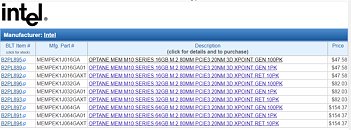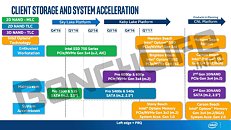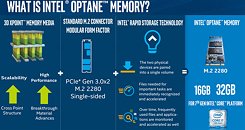Raevenlord
News Editor
- Joined
- Aug 12, 2016
- Messages
- 3,755 (1.34/day)
- Location
- Portugal
| System Name | The Ryzening |
|---|---|
| Processor | AMD Ryzen 9 5900X |
| Motherboard | MSI X570 MAG TOMAHAWK |
| Cooling | Lian Li Galahad 360mm AIO |
| Memory | 32 GB G.Skill Trident Z F4-3733 (4x 8 GB) |
| Video Card(s) | Gigabyte RTX 3070 Ti |
| Storage | Boot: Transcend MTE220S 2TB, Kintson A2000 1TB, Seagate Firewolf Pro 14 TB |
| Display(s) | Acer Nitro VG270UP (1440p 144 Hz IPS) |
| Case | Lian Li O11DX Dynamic White |
| Audio Device(s) | iFi Audio Zen DAC |
| Power Supply | Seasonic Focus+ 750 W |
| Mouse | Cooler Master Masterkeys Lite L |
| Keyboard | Cooler Master Masterkeys Lite L |
| Software | Windows 10 x64 |
The next step in Intel's Optane product launch could be right around the corner, as retailers have started listing the company's upcoming Optane MEM M10 cache drives up for pre-order. If you'll remember, these products were first leaked in some Intel product roadmap slides, where they appeared identified as "System Acce. Gen 1.0". Whether or not today's workloads and faster SSD-based storage require the introduction of a faster caching solution is up for debate; however, Intel seems to think there is room in the market for these caching solutions, even if the vast majority of users would be much better served by acquiring a higher capacity SSD as their primary drive (especially if they're coming from the HDD world).
These new Optane MEM M10 cache drives will come in capacities ranging from 16 GB to 64 GB. The M10 modules will take the M.2 2280 form-factor and deliver data through the PCIe 3.0 interface. Prices are being quoted at $47.58 for the 16 GB model, $82.03 for the 32 GB model, and $154.37 for the largest, 64 GB model. These should ensure lower latency and higher throughput than traditional SSDs do, due to their caching of users' more heavily requested data; however, due to the very nature of these caching solutions, and the memory footprint available for them, it's likely most users will hit severe performance bottlenecks, at the very least, on the 16 GB model.



View at TechPowerUp Main Site
These new Optane MEM M10 cache drives will come in capacities ranging from 16 GB to 64 GB. The M10 modules will take the M.2 2280 form-factor and deliver data through the PCIe 3.0 interface. Prices are being quoted at $47.58 for the 16 GB model, $82.03 for the 32 GB model, and $154.37 for the largest, 64 GB model. These should ensure lower latency and higher throughput than traditional SSDs do, due to their caching of users' more heavily requested data; however, due to the very nature of these caching solutions, and the memory footprint available for them, it's likely most users will hit severe performance bottlenecks, at the very least, on the 16 GB model.



View at TechPowerUp Main Site

